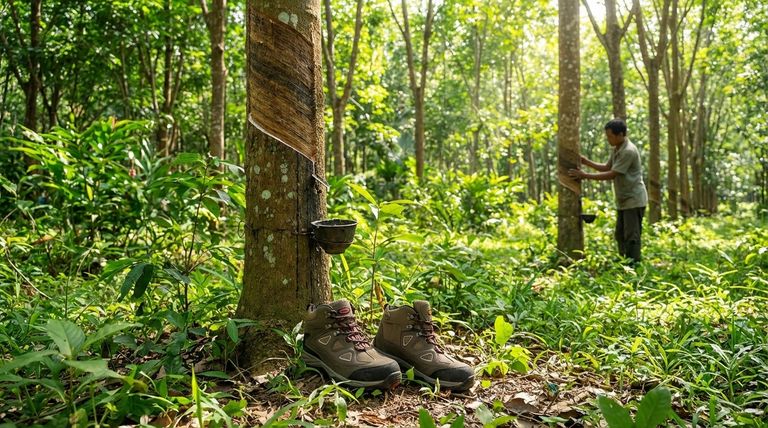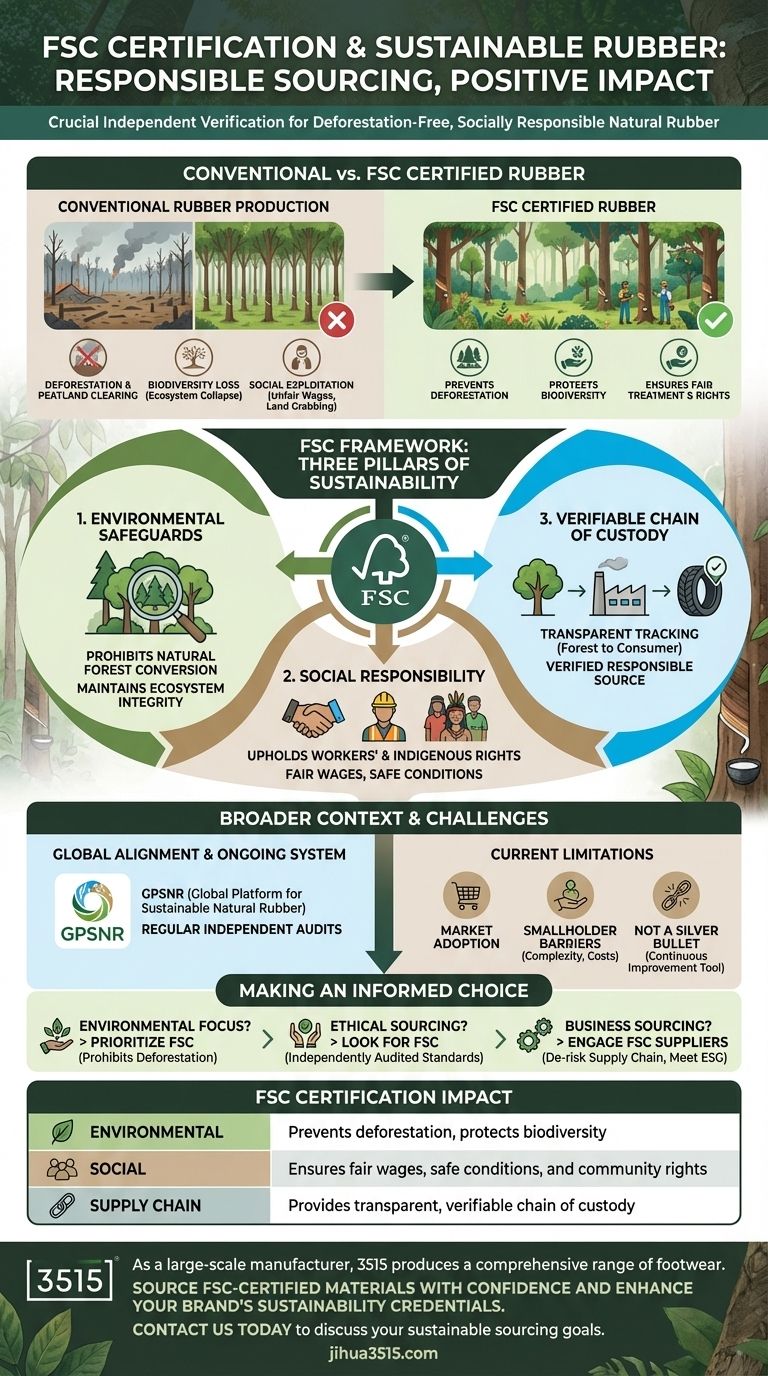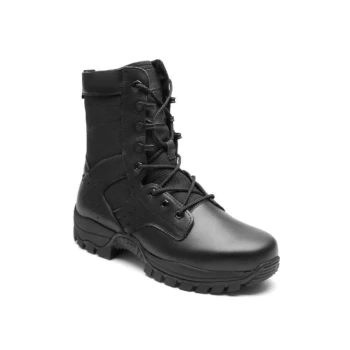In the complex world of sustainable materials, FSC certification serves as a crucial, independent verification that natural rubber is sourced from responsibly managed forests. It provides a credible guarantee that the production process actively prevents deforestation, protects biological diversity, and ensures fair treatment and compensation for workers and local communities.
The conventional rubber industry is often tied to significant deforestation and social exploitation. FSC certification directly addresses these core problems by establishing a comprehensive set of environmental and social standards, creating a verifiable and transparent supply chain from the forest to the final consumer.

The Problem with Conventional Rubber Production
To understand the value of FSC certification, it's essential to first recognize the challenges it was designed to solve.
The Link to Deforestation
The vast majority of natural rubber comes from monoculture plantations. Soaring demand often drives the clearing of vital natural forests and peatlands to make way for these less diverse rubber tree farms, particularly in Southeast Asia.
Biodiversity Loss
When a diverse, natural forest is replaced by a single-species plantation, the ecosystem collapses. This results in a drastic loss of habitat for countless plant and animal species and degrades the overall health of the environment.
Social and Labor Issues
The rubber industry has also been associated with significant social problems. These can include land grabbing from Indigenous peoples and local communities, poor and unsafe working conditions for plantation laborers, and unfair wages.
How FSC Certification Provides a Solution
The Forest Stewardship Council (FSC) establishes a framework of principles and criteria that directly counteract the problems inherent in conventional rubber production.
Environmental Safeguards
FSC standards strictly prohibit the conversion of natural forests or any other high conservation value areas into plantations. The certification requires forest managers to maintain or enhance the ecosystem's integrity, ensuring that biodiversity and natural processes are protected.
Upholding Workers' and Indigenous Rights
A core part of the FSC framework is its commitment to social responsibility. Certification mandates that operations uphold the rights of workers to fair wages and safe conditions. It also requires that the legal and customary rights of Indigenous peoples to their lands and resources are respected.
Verifiable Chain of Custody
FSC provides a transparent "chain of custody" that tracks the certified material from the forest through every stage of processing and production. This ensures that any product bearing the FSC label contains rubber from a verified, responsible source.
Understanding the Broader Context
FSC does not operate in a vacuum. Its role is amplified by its position within wider industry movements.
A Key Player in Global Platforms
The FSC is a founding member of the Global Platform for Sustainable Natural Rubber (GPSNR). This platform brings together car and tire manufacturers, rubber producers, and civil society to create industry-wide alignment on sustainability, reinforcing the principles championed by FSC.
More Than Just a Label
It is critical to see FSC certification not as a simple stamp on a product, but as evidence of an ongoing management system. Certified plantations are subject to regular, independent third-party audits to ensure they remain in compliance with the FSC's rigorous standards.
Acknowledging the Limitations and Challenges
While FSC certification is a powerful tool, it's important to approach it with a clear-eyed view of its current limitations.
Market Adoption and Scale
The market for FSC-certified natural rubber is still a small fraction of the total global supply. Driving widespread demand from consumers and major industries, like the tire sector, is essential for the system to achieve its full potential impact.
Complexity for Smallholders
A significant portion of the world's rubber is produced by small-scale farmers. For these smallholders, the costs and administrative complexity of achieving and maintaining FSC certification can be a major barrier without adequate support and resources.
Certification Is Not a Silver Bullet
No certification system is perfect. The effectiveness of the FSC standard relies on the rigor of its auditors and the commitment of certified companies. It is a tool for driving change, not a final guarantee of perfection.
Making an Informed Choice
Your purchasing and sourcing decisions can directly influence the future of the rubber industry.
- If your primary focus is environmental impact: Prioritize products with the FSC label, as this is the leading standard that explicitly prohibits deforestation and protects biodiversity in rubber production.
- If your primary focus is ethical sourcing and labor rights: Look for FSC certification as a key, third-party indicator that social standards, including worker safety and community rights, have been independently audited.
- If you are a business sourcing materials: Engaging with FSC-certified suppliers helps de-risk your supply chain, meet ESG goals, and demonstrate a tangible commitment to responsible practices.
By understanding and choosing FSC-certified rubber, you directly support a system that values the long-term health of forests and people.
Summary Table:
| FSC Certification Impact | Key Benefit |
|---|---|
| Environmental | Prevents deforestation, protects biodiversity |
| Social | Ensures fair wages, safe conditions, and community rights |
| Supply Chain | Provides transparent, verifiable chain of custody |
As a large-scale manufacturer, 3515 produces a comprehensive range of footwear for distributors, brand owners, and bulk clients. Our production capabilities encompass all types of shoes and boots.
Source FSC-certified materials with confidence and enhance your brand's sustainability credentials. Our expertise in responsible manufacturing ensures your products meet the highest environmental and ethical standards while maintaining quality and scalability. Contact us today to discuss how we can support your sustainable sourcing goals.
Visual Guide

Related Products
- Safety Footwear Wholesale Manufacturer for Custom OEM/ODM Production
- Durable Goodyear Welt Leather Work Boots for Wholesale & Private Label
- Premium Wholesale Wheat Nubuck Safety Boot with Rapid Lacing System
- Premium Grain Leather Safety Boots for Bulk Supply
- Customizable Anti-Smash Safety Boots for Wholesale & Private Label Manufacturing
People Also Ask
- How does a mobile application facilitate gait monitoring? Streamline Your Research with Real-Time Data Visualization
- What are the benefits of custom wheel leather welts and rands in western boots? Discover Superior Craftsmanship & Durability
- How do ECG monitoring devices provide safety assurance during high-intensity footwear stress testing? Safeguard Athletes
- What should you do if cowboy boots get wet? A Step-by-Step Guide to Prevent Damage
- What are the requirements for bacterial strain passaging control? Ensure Quality Stability for BC Leather Production
- How does image difference software support the quantitative assessment of protective gear? Precision Data for Footwear
- Why is a Between-subjects design preferred for footwear performance testing? Key Benefits for Material Integrity
- Why is a cloud-based management system necessary for the optimization of deep learning models used in smart footwear?



















